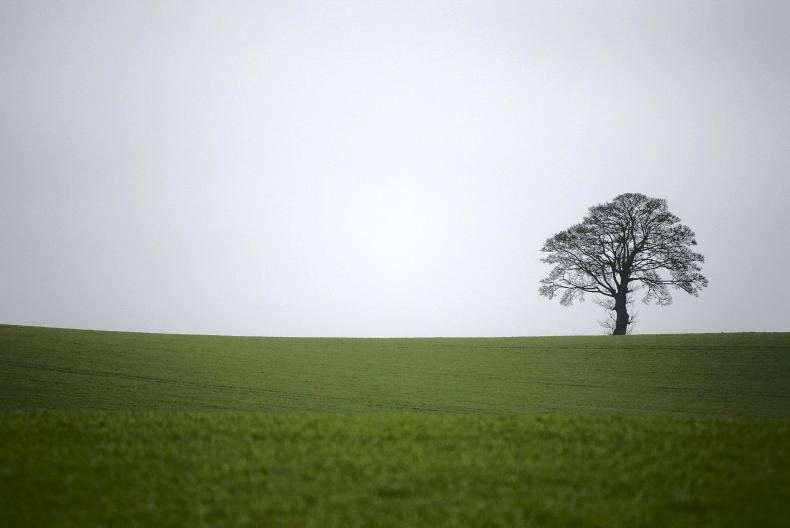We are arguing that the level of support should be the same in the rural areas. But we need to spend it differently,” believes Peter Ritchie, director of Nourish Scotland, who has been reacting to NFU Scotland’s plans for support post-Brexit.
Nourish Scotland, an influential NGO that campaigns across food production, the environment, local economy, health and social justice, and has questioned the effectiveness of some of the key components of support on which farmers have come to rely.
“What we are trying to do is replace one unsatisfactory system with something that works better,” said Peter. “But we are not facing up to what happens as the overall volume of subsidy goes down. With the UK government, it is hard to see how it will go up. We are not Norway or Finland: there isn’t a history of giving loads of money from the treasury.”
In relation to plans put forward by the National Farmer Union of Scotland in its ‘‘Steps to Change’’ document launched in Holyrood last week, Nourish queries the need to maintain direct revenue support to farmers.
“Our difficulty with basic payments is that they are not effective, as you don’t know what you actually get for the money. You don’t influence enough of the farmer’s behaviour. The people who need it the least get the most money. So basic payments aren’t logical. We have to find some other way of giving that money.”
Less Favoured Areas Support Scheme
On the Less Favoured Areas Support Scheme (LFASS), Nourish appreciated the aspirations of the model but felt it needed changing.
“There is some logic to LFASS. It is pretty hard to farm in big parts of Scotland. Farming of some of these marginal lands is important, so we need to find a better way of supporting them.”
Scotland currently has two coupled support schemes: one for calves and the other for ewe hoggs in mountainous areas. Peter is uncertain whether directly supporting production accomplishes what people want. “The difficulty is: do we know if it achieves the policy objective? We don’t know yet if it is doing anything. It is a very crude instrument, and I am not sure it works. If we could say: ‘What’s the policy objective?’ and see it be achieved, then fair enough – but there are other things we could do.”
Peter advocates doing more to support the supply chain than paying money on the calf or ewe hogg.
If Scotland were to retain schemes similar to the basic payment, LFASS and coupled support, Peter questions how much money would be left for other rural objectives. He is also unsure how much cash would be freed up by omitting inactive claimants.
“They (NFUS) always talk about getting payment to the active farmer, but it’s not clear how much money that will free up. There is no mention of capping in the document either,” he said.
Advice
Nourish Scotland would like to give more advice to farmers to help them improve their business for the future. They want to see a green transition fund for loans and grants to help farmers be more environmental. Particularly, they want to see more one-to-one advice quickly, so that farms stop losing money. There is no point in waiting until 2027 for this, they believe.
Peter was clear that this needs to include diversification, which can help prop up loss-making farm businesses that attract tourists and support communities.
“Everyone wants to see farming do well,” Peter explained, “but we also need to use less pesticides, improve our soil, use less antibiotics, have good animal welfare and we need farmers to achieve this. You can’t have a good food nation without farmers. Everyone wants to see a prosperous farming sector.”
Peter thinks that the union’s vision for farming has similar objectives to Nourish Scotland’s, but there is a difference in the pace of change they advocate and in emphasis. He stressed: “We are not against farming.”
Multi-annual schemes
They would like to see more multi-annual schemes, as opposed to those lasting only a year. “They don’t make sense doing it one year at a time. If you want to build up wildlife or create a habitat, you need to do it over a number of years.
“We want something where a farmer says: ‘Here is my plan, and this is what it will achieve in terms of improving bio-diversity, or locking up carbon or improving our soil, or improving animal welfare on farm. Or even making the farm look nicer with access for the general public.’ This is what we should be paid for doing: something that helps the public, as opposed to just the farm,” he concludes.
Measures Nourish would like to see in the future
Agro-forestry.Schemes to reduce pesticide and nitrogen usage.Cooperative schemes.Organic support.Tenant farmer-focused multi-annual environmental schemes.About Peter Richie
Pete Ritchie runs Whitmuir Organic Farm and shop at Lamancha, near West Linton, in the Scottish Borders. He has a background in community development and social policy. He is executive director of Nourish Scotland.
We are arguing that the level of support should be the same in the rural areas. But we need to spend it differently,” believes Peter Ritchie, director of Nourish Scotland, who has been reacting to NFU Scotland’s plans for support post-Brexit.
Nourish Scotland, an influential NGO that campaigns across food production, the environment, local economy, health and social justice, and has questioned the effectiveness of some of the key components of support on which farmers have come to rely.
“What we are trying to do is replace one unsatisfactory system with something that works better,” said Peter. “But we are not facing up to what happens as the overall volume of subsidy goes down. With the UK government, it is hard to see how it will go up. We are not Norway or Finland: there isn’t a history of giving loads of money from the treasury.”
In relation to plans put forward by the National Farmer Union of Scotland in its ‘‘Steps to Change’’ document launched in Holyrood last week, Nourish queries the need to maintain direct revenue support to farmers.
“Our difficulty with basic payments is that they are not effective, as you don’t know what you actually get for the money. You don’t influence enough of the farmer’s behaviour. The people who need it the least get the most money. So basic payments aren’t logical. We have to find some other way of giving that money.”
Less Favoured Areas Support Scheme
On the Less Favoured Areas Support Scheme (LFASS), Nourish appreciated the aspirations of the model but felt it needed changing.
“There is some logic to LFASS. It is pretty hard to farm in big parts of Scotland. Farming of some of these marginal lands is important, so we need to find a better way of supporting them.”
Scotland currently has two coupled support schemes: one for calves and the other for ewe hoggs in mountainous areas. Peter is uncertain whether directly supporting production accomplishes what people want. “The difficulty is: do we know if it achieves the policy objective? We don’t know yet if it is doing anything. It is a very crude instrument, and I am not sure it works. If we could say: ‘What’s the policy objective?’ and see it be achieved, then fair enough – but there are other things we could do.”
Peter advocates doing more to support the supply chain than paying money on the calf or ewe hogg.
If Scotland were to retain schemes similar to the basic payment, LFASS and coupled support, Peter questions how much money would be left for other rural objectives. He is also unsure how much cash would be freed up by omitting inactive claimants.
“They (NFUS) always talk about getting payment to the active farmer, but it’s not clear how much money that will free up. There is no mention of capping in the document either,” he said.
Advice
Nourish Scotland would like to give more advice to farmers to help them improve their business for the future. They want to see a green transition fund for loans and grants to help farmers be more environmental. Particularly, they want to see more one-to-one advice quickly, so that farms stop losing money. There is no point in waiting until 2027 for this, they believe.
Peter was clear that this needs to include diversification, which can help prop up loss-making farm businesses that attract tourists and support communities.
“Everyone wants to see farming do well,” Peter explained, “but we also need to use less pesticides, improve our soil, use less antibiotics, have good animal welfare and we need farmers to achieve this. You can’t have a good food nation without farmers. Everyone wants to see a prosperous farming sector.”
Peter thinks that the union’s vision for farming has similar objectives to Nourish Scotland’s, but there is a difference in the pace of change they advocate and in emphasis. He stressed: “We are not against farming.”
Multi-annual schemes
They would like to see more multi-annual schemes, as opposed to those lasting only a year. “They don’t make sense doing it one year at a time. If you want to build up wildlife or create a habitat, you need to do it over a number of years.
“We want something where a farmer says: ‘Here is my plan, and this is what it will achieve in terms of improving bio-diversity, or locking up carbon or improving our soil, or improving animal welfare on farm. Or even making the farm look nicer with access for the general public.’ This is what we should be paid for doing: something that helps the public, as opposed to just the farm,” he concludes.
Measures Nourish would like to see in the future
Agro-forestry.Schemes to reduce pesticide and nitrogen usage.Cooperative schemes.Organic support.Tenant farmer-focused multi-annual environmental schemes.About Peter Richie
Pete Ritchie runs Whitmuir Organic Farm and shop at Lamancha, near West Linton, in the Scottish Borders. He has a background in community development and social policy. He is executive director of Nourish Scotland.






 This is a subscriber-only article
This is a subscriber-only article









SHARING OPTIONS: